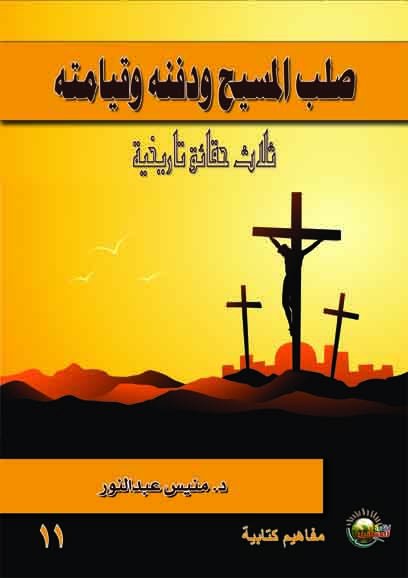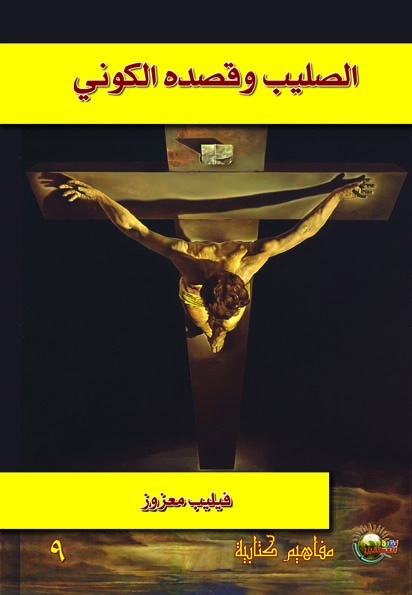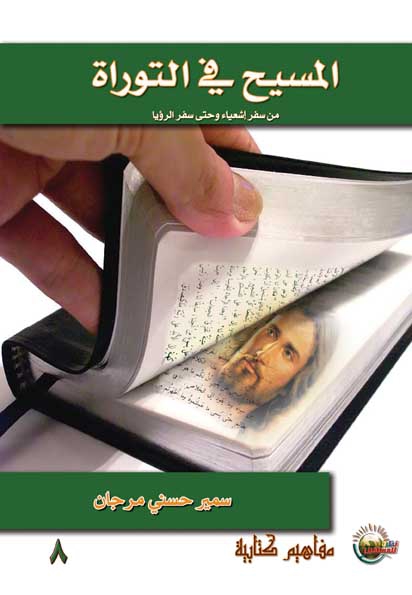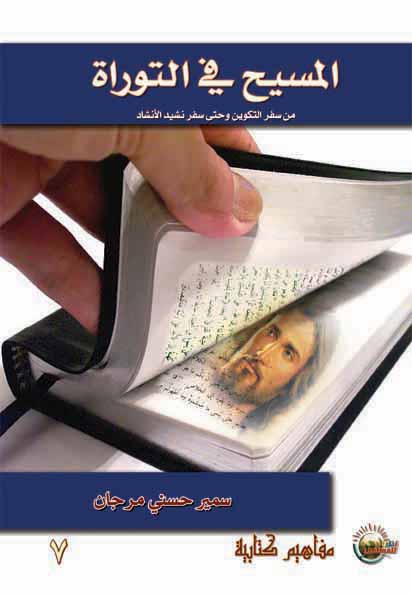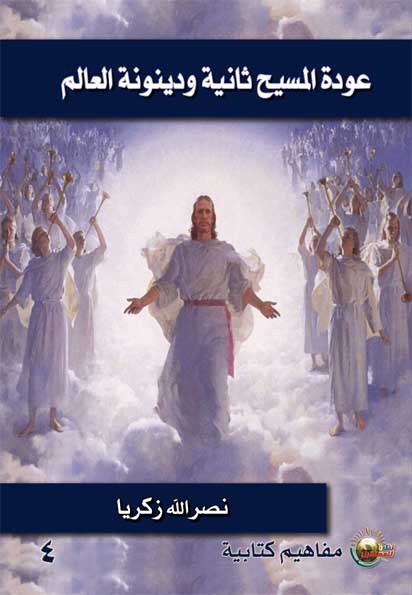Biblical Concepts
There is no doubt that we are all prone to stumbling in our spiritual life due to the wrong concepts of theology which we have formed in our minds. This series is designed to discuss key spiritual concepts in a way that reveals and clarifies biblical truths and is comprehensible to the contemporary Arabic mind.
God Become Flesh
Author: Rev. Menes Abdel Nour
Publisher: Vision For Future
In this medium sized book, of 145 pages, divided into three parts, Rev. Menes Abdel Nour explains the importance and necessity of Christ's incarnation. It is the fifth book in the Biblical Concepts series.
The assertion is that God manifested himself in the flesh as a fulfillment of his own eternal plan for Man's salvation. Rev. Menes presents this theological issue in an easy and simple way in order to answer all the questions that might possibly cross a reader's mind.
Part One
To begin the book, the author touches on the divine aspects of Christ's person. In the first two chapters he talks about the apostles' testimony and highlights Christ's testimony about himself as well. Christ attested to his divinity, not only by having continual companionship with God, but also by proving that He possessed a divine nature. Several parts of the bible cited His attestation of such, as John 12:44 does: "Whoever believes in me does not believe in me only, but in the one who sent me".
Rev. Menes cites, as well, the testimonies of the angel, Gabriel, the three Magi/wise-men, John the Baptist, Thomas, the apostle, Stephen, Peter, and Paul. Furthermore, he brings to our attention the resurrection of Jesus, and attestations to it, from the historical church.
In Chapter 3, entitled, "Jesus existed before His birth," the author draws our attention to a key element of Christ's divinity, stating, "Christ's existence or raison d'être is self-caused," it is not caused by an external source. When Christ stated: "I AM," His words were referring to God's mighty name, mentioned in the Old Testament, with the meaning being God's mighty greatness and majesty. But Christ's was not only pointing to his self-existence. The literal translation of "I AM THAT I AM" is "The one who has forever existed and exists." It is the name that declares that God alone is the eternal being; the same name is attributed to Christ in the book of revelation.
Next, in Chapters Four and Five the author touches on the epithets of Christ and on His attributes. He mentions the angelic announcement to Joseph and Mary that the Child's name will be "Jesus," which means, "Savior." Jesus is the Greek designation of the Hebrew name, "Joshua," which literally means, "Jehovah is salvation." Christ means the anointed by God. It is the known designation for the One who saves others. Thus, the composite name of Jesus Christ means the "Anointed Savior," the savior who has the same stature as God. The New Testament also mentions Jesus' divine attributes: perfect, without blemish; the judge of all people; the source of life; the omnipotent; the forgiver of sins; the creator.
In Chapter Six, the author tackles the miracles of Christ, by defining the word for "miracle," telling the reader that this refers to an act or a public event done directly by the power of God, with the purpose of evidencing the trueness of an apostle's message. Furthermore, in his elaboration about Christ's miracles, he says: The miracles done by Jesus were different in nature and style than the ones accomplished by apostles and prophets. Jesus did miracles by His power not by means of an external power. He emphasized His own power, greatness and majesty every time He did a miracle. In this way, he presented clear evidence of His divinity.
With this as its context, Chapter Seven begins by asking the question: "On what basis does the glory of Christ stand?" Quoting from the book of The Fundamentals of Faith, the author says, "The glory of Christ is founded on his resurrection from the dead and ascension to heaven, and on his sitting at the right hand of God Father, and on his return to judge the world on the last day." He then mentions four results stemming from Christ's resurrection:
The first result: A complete makeover occurred in the minds and hearts of the disciples.
The second result: Jesus' ascended to Heaven and sits at the right hand of God the Father, where all honor, power, and majesty are centered.
The third result: By sitting on the right Hand of greatness, Jesus directs the affairs of His kingdom and maintains it in full.
The fourth result: His second coming will be with might and in great glory to judge the whole world.
As for the "Infallibility of Christ," which is the title of Chapter Eight, Rev. Menes says that the infallibility of Christ "is the backbone of the proof of His qualification to be the only mediator between God and men. If he failed, even just one slip in his life on earth, everything He came to build would have been destroyed. His inerrancy evidences His divinity and that He is the only good man able to fulfill the work of redemption. In addition to this, the resurrection of Christ from the dead could not have happened if Christ had not enjoyed total infallibility."
Pastor Menes concludes this part of the book by addressing the importance of believing in the divinity of Christ. According to the Bible's teaching it is crucially fundamental. In the face of the revelation of the deity of Christ, what will be the fate of those who deny it?
Part Two
In the second part of the book, Rev. Menes deals with Christ's humanity. He touches on many aspects of this, referred to by the topic of the First Chapter: "The evidences of Christ's humanity." When Christ was on earth, He enjoyed his human nature truly and fully. The New Testament attributed human feelings and experiences to Christ, among them his birth, growth, thirst, anger, death, and in every one of these parts we see the amazing dual-truth about the life of Jesus. He enjoyed a divine and human nature at the same time.
The Second Chapter deals with an issue that raises questions for many: "How could the Son of God become a human?" It is the most argument-inducing topic and one which incites the community around the Middle East. To this question, we find that Rev. Menes gives a simple and convincing answer that can be approved intellectually.
The miraculous advent of Christ from a virgin shows us different sides of the fulfillment of God's redemptive purposes. This birth is what made Christ able to carry the sins of countless perishing human beings. But why did God chose this way, exclusively, for the coming of the Savior? And what did the virgin birth of the Christ achieve? This is answered by Rev. Menes in the Third Chapter of the book's second part.
Part Three
With regard to the third part, which is titled "Great is the mystery of godliness: God was manifest in the flesh," the First Chapter addresses "The compatibility of Christ humanity and divinity." In it, Rev. Menes attempts to address the implications of Christ's divinity, and of His humanity. He says "Many non-Christians wonder how Christ could be a man and God at the same time. In fact, it seems illogical to me although I am Christian, but I believe that one cannot comprehend that without the Holy Spirit."
The author argues that one of the most important and dangerous dogmatic divergences in the history of Christianity was around the lack of clarity over the two natures, favoring one over the other, or giving one a position that makes the other lose its share and role in the balanced person of Christ. He shows us the compatibility between the two natures in a simple manner, but mental assent or conviction alone is not enough.
Chapter Two in this third part of the book looks at "Christ's Triple Role," revealing that Christ had three functions in the fulfillment of redemption: Prophet, Priest, and King.
As a prophet: God had already sent many prophets who preceded Christ in preparation for His advent. They gradually prophesied about His coming so that people could accept it. The divine revelation took the form of a graded pyramid, where Jesus sat on its pinnacle as the author and finisher of the revelation.
As a priest: Priests are those who represent the people before God. On Christ's shoulder fell two tasks: representing the people and interceding for them before God. But the role of the priest in the Old Testament was only a symbolic task. Jesus took the role of priest in actuality, in His atoning work.
As a king: Jesus is granted special royal stature as the mediator between God and people. The royalty of Christ is dependent on His being the incarnate Son of God. From the opposite perspective, the fact that Christ was redeemer and mediator gives him the unique authority of a king who is over all creatures.
The author refers to an important point which we must never overlook, which is the role of prophecies that presented a direct demonstration about the advent of the savior. This is the topic of Chapter Three in the third part of the book, "Jesus is the finisher of the prophecies of revelation." It was essential for prophecies to be revealed gradually in human history. Had the revelation of the divine incarnation of Christ been suddenly disclosed, people would have never been able to accept the idea.
The preparatory steps were required, and had to run their course. The issue of preparation was not simple. It required a perfecting of time and place of revelation, in the appropriate historical, social, and spiritual circumstances, for the world to be ready to accept the coming of Christ. Humanity needed this preceding preparation to understand the circumstances and events if they were ever to understand the significance and purpose of divine incarnation.
For these reasons, Rev. Menes concludes with Chapter Four "The life of Christ fulfilled the salvation plan." The prophecies of the Old Testament had prepared the way and all of them were perfectly fulfilled in the life of Christ. Every incident that led to this fundamental work was planned by God Himself, not as defeats, but rather victories. God preordained this. It was never His enemies who played with events. Although crucifixion seemed awkward to His disciples, it was, in fact, the completion of the long-planned mission Christ had come to carry out, to open a new and ever-open door to the kingdom of life.










